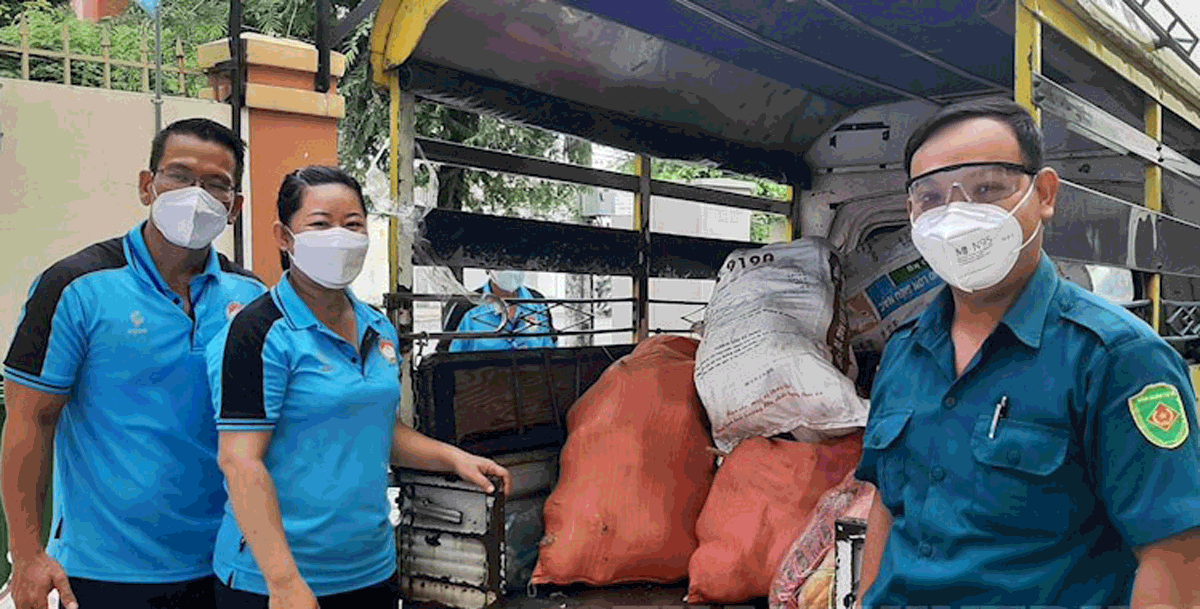
(HBO) – A special train coded HB2021 departed Giap Bat Station in Hanoi on 20:45 of August 11 for the south, carrying more than 300 tonnes of goods and necessities donated by residents of Hoa Binh to support the needy in COVID-hit localities of Binh Duong and Ho Chi Minh City.
The train arrived in
Song Than Station in Binh Duong in the early morning of August 14. The Hanoi
Railway joint Stock Company transported the goods, which filled 11 coaches, for
free.
 Officials from the Vietnam Fatherland Front Committee and the militia
force of Ward 5, Tan Binh district of HCM City receive the goods provided by
Hoa Binh province to support COVID-19-hit people.
Officials from the Vietnam Fatherland Front Committee and the militia
force of Ward 5, Tan Binh district of HCM City receive the goods provided by
Hoa Binh province to support COVID-19-hit people.
Upon the train's arrival in Song Than Station, the goods were unloaded and
handed over to HCM City (250 tonnes) and Binh Duong (50 tonnes).
The Vietnam Fatherland Front Committees of HCM City and Binh Duong coordinated
with the militia and military forces to receive, transport and distribute the
goods to the needy. The benefited people are those in quarantine and
locked-downed areas, poor labourers, homeless people, workers losing their
jobs, and disadvantaged people.
Photo: Residents of Hoa Binh origin in Binh Chieu district of Thu Duc city in
HCM City receive goods and necessities sent from Hoa Binh.
The unloading and handing over of the goods at the station was completed right
on August 14. Districts of HCM City then distributed the goods to localities so
that they reach the needy as soon as possible. Residents in HCM City were
deeply moved by the gifts from Hoa Binh as they arrived timely in such a tough
time.
Earlier on August 6, the Vietnam Fatherland Front Committee of Hoa Binh called
on Party Committees and administrations at all levels, organisations, agencies,
businesses and people from all walks of life in Hoa Binh to donate essential
goods to support pandemic-hit people in HCM City, the current biggest COVID-19
hotspot of the country.
The appeal was met with warm response. As of August 10, the VFF Committee
received more than 370 tonnes of goods from 132 collectives and many
individuals in response to the call./.
The Standing Board of the Hoa Binh provincial Party Committee has agreed in principle on a proposal by the Standing Board of the Party Committee of Hoa Binh city to gather feedback on the city’s 1:2000 zoning plan, which forms part of its broader urban development strategy.
Hoa Binh province has made notable progress in public administration reform and digital government development, with the satisfaction index among citizens and businesses reaching over 84%, according to recent government evaluations.
Thanks to great efforts by local authorities in recent times, the governance and public administration performance of Mai Chau district has been significantly improved.
In the afternoon of June 6, the Party Committee, the People's Council, the People's Committee and the Fatherland Front of Lac Son district solemnly held a meeting to celebrate the 139th anniversary of the district's founding (1886–2025) and the 79th anniversary of the establishment of the district's Party Committee (1946–2025). There was the attendance of Mr. Bui Van Thang, the Vice Chairman of the Provincial People's Council; Mr. Quach Tat Liem, the Vice Chairman of the Provincial People's Committee; Ms. Dang Bich Ngoc, the Deputy Head of the National Assembly Delegation of the province; as well as the former leaders of the province and district through various periods, who are the natives of the district.
Implementing the Politburo’s Resolution No. 57-NQ/TW on breakthroughs in science – technology, innovation, and digital transformation is a golden opportunity for the northern mountainous province of Hoa Binh to renew growth model, improve competitive edge and shorten digital gap.
Resolution 57-NQ/TW, issued by the Politburo on December 22, 2024, identifies sci-tech, innovation, and digital transformation as strategic breakthroughs to build a developed and prosperous nation. In Hoa Binh province, this spirit is not just a slogan, it’s being put into action through concrete initiatives that form a "new development triangle”: digital citizenship, digital economy, and digital administration.



 Officials from the Vietnam Fatherland Front Committee and the militia
force of Ward 5, Tan Binh district of HCM City receive the goods provided by
Hoa Binh province to support COVID-19-hit people.
Officials from the Vietnam Fatherland Front Committee and the militia
force of Ward 5, Tan Binh district of HCM City receive the goods provided by
Hoa Binh province to support COVID-19-hit people.